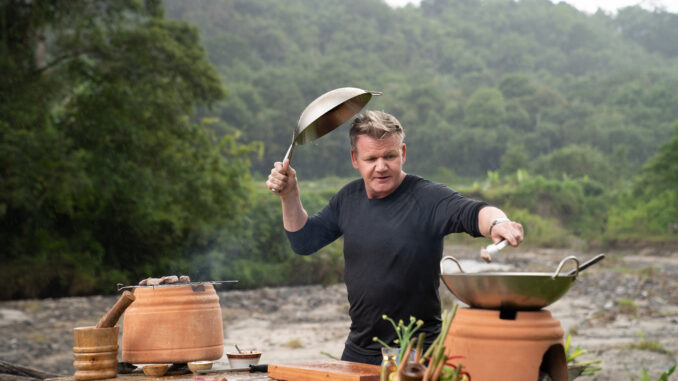
In a rare and remarkably open interview, Gordon Ramsay—one of the world’s most recognizable culinary figures—offered a sweeping look at the state of food, the evolution of television cooking shows, and his rapidly expanding global restaurant empire. Known for his razor-sharp critiques and uncompromising standards, Ramsay’s latest conversation reveals a surprisingly reflective chef who remains relentlessly committed to excellence while embracing new trends shaping the industry.
Speaking first about his television career, Ramsay acknowledged that the medium has transformed dramatically since Hell’s Kitchen premiered two decades ago. Yet he maintains that innovation remains the key to longevity. “You can’t serve the same dish forever,” he said, hinting that Next Level Chef—which he called “the most forward-thinking competition on TV”—is only the beginning of what he plans to do with immersive, high-stakes formats. He also teased upcoming projects across FOX, BBC, and streaming platforms, reigniting speculation about a new slate of international shows.
The interview also highlighted Ramsay’s deep dedication to culinary education, especially for young chefs hoping to break into a notoriously demanding profession. “Talent is nothing without discipline,” he emphasized. Ramsay argued that social-media fame has created misconceptions about the realities of kitchen life. He insisted that aspiring chefs must first master the fundamentals before attempting creative experimentation. “You can’t run before you can walk,” he said—a message that has become one of his signature refrains.
Ramsay’s business ambitions remain as bold as ever. With more than 80 restaurants worldwide, he is accelerating global expansion even as many F&B outlets struggle post-pandemic. From the booming success of Hell’s Kitchen Restaurant in Las Vegas to the rising popularity of Lucky Cat, Gordon Ramsay Burger, and Street Pizza, the chef’s culinary empire continues to grow at a staggering pace. He spoke candidly about the challenges of maintaining consistency across continents, noting: “A guest in Dubai deserves the same experience as a guest in London.”
Another standout moment came when Ramsay shared his thoughts on the future of global cuisine. He predicted that sustainability, ethically sourced ingredients, and elevated street food would dominate the coming decade. While he embraces technology—acknowledging the role of AI in menu engineering and restaurant operations—he dismissed any suggestion that machines could replace human intuition. “A recipe doesn’t have a soul. A chef does,” he stated firmly.
Beyond the kitchen, Ramsay also opened up about his family, offering warm reflections on raising young children at 50-plus and supporting his daughter Tilly’s growing media career. He credited his wife, Tana, as the anchor who keeps his high-voltage life balanced. These personal insights, delivered with quiet sincerity, provided a softer contrast to his famously fiery television persona.
Ultimately, the interview paints a portrait of a chef who is evolving without losing the intensity that made him iconic. Ramsay remains an unstoppable force—one who continues to push boundaries, challenge norms, and shape global culinary culture. And, as he hinted, the next chapter of his career may be his most groundbreaking yet.
